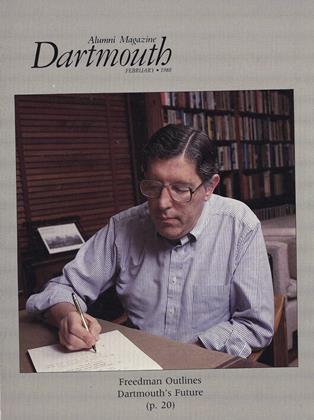Baby Freshmen
For years Corey Ford, who was an author in residence at Dartmouth during the 1950s and 19605, wrote a monthly column in Field and Stream, "Minutes of the Lower Forty." Many of the fictional members of the Lower Forty Shooting, Angling and Inside Straight Club were based on people and places in the Hanover area. A collection of Ford's columns, "The Corey Ford Sporting Treasury" (Willow Creek), includes an essay, "How to Guess Your Age," which is excerpted below.
I went back recently to an alumni reunion at the college I graduated from in 1943—that is, 1933—1 mean, 1923 and I was shocked to see the mere tots they're admitting as students these days. The average age of the freshman class couldn't have been more than seven. They seem to be more polite than in my time, though; several undergraduates called me "Sir," and one of them asked me if he could help me across the street.
Between the Covers
Combining cultural history with narrative analysis, Michael Denning '80's "Cover Stories" (Routledge and Kegan Paul) explores the two main traditions of the thriller genre: the thriller of work, in which the anxieties of the organization man take on a secret coherence; and the thriller of leisure, in which sports and games become dangerous political contests. This passage reveals novelists' varied approaches to the risks of killing time.
Both critics and enthusiasts of James Bond focused on his sexual adventures; they all noted that the Bond tales were the first British thrillers to make sexual encounters central to the plot and to the hero. The thrillers of Buchan, Sapper, and Ambler all avoided anything but the most fleeting accounts of sexual relations, and whatever erotic energy they had was covert or displaced into other codes, particularly into representations of violence and torture.
Eskimo Trial
Weyman Lundquist '52 has been a trial lawyer for 30 years. He has twice served as Dartmouth's Henry Luce Visiting Professor in Environmental Studies; two of his nine children (Erica '85 and Weyman '81) have graduated from the College. The author of numerous legal articles, Lundquist has just written his first work of fiction—"The Promised Land and Other Courthouse Adventures," which is a series of semi-autobiographical stories published by the American Bar Association.
After completing Harvard Law School in 1955, Lundquist served as an assistant U.S. attorney in Boston and then took on a similar assignment in Alaska. In his story, "The Nome-Kotzebue Bar," he describes a courtroom battle north of the Arctic Circle with a Nome lawyer named Frank Croft, who in the middle of the trial keeps making asides to the jurors, all Eskimos, in their native tongue.
As my case got longer, so did Frank's Eskimo asides. After a particularly extended one, I tried another objection. Judge Hodge, now at least curious, said, "What did you tell them this time, Frank?"
"Your Honor, I told them to relax, to take things calmly. They are concerned, you know, that this courthouse will sink like the last one." This was literally true. The former courthouse, built in the late 19305, had been foundationed into the permafrost of the tundra. When they fired up its boilers, it proceeded to melt its way into the permafrost, first sinking, then slowly cracking in the middle. No lives were lost.
"They are afraid this courthouse might go down too, but I'm reassuring them, asking them to keep calm until the trial's over." And, looking at me: "I've assured them that when justice is done everything comes out right in the end." Frank owned the deck.
That night, we settled the case on Frank's terms less 20 percent.
Puppet Medicine
Frank Gado '58 is the author of "The Passion of Ingmar Bergman" (Duke University), a critical biography of the great Swedish filmmaker. Below, Gado writes of Bergman's early work, which inspired a cultlike following among its public.
From the very beginning, Bergman approached storymaking as a way of solving problems: if that theater of puppets he controlled in his fiction could be made to enact the answers, then, in some magical way, the rite would undo the problem—reality would imitate art. The straining to perform this sympathetic magic is most evident in the early films, where "happy endings" are plucked from air to dissipate a turbulence in the depths beneath the story's surface.
Legal Aid
"Personal Injury and Product Liability Litigation" (PrenticeHall) is written for lawyers who do not have extensive experience in the specialized field of personal injury. Author Howard Reiss '73, a partner at Solin and Breindel in New York, provides a stepby-step approach from the initial client contact through trial.
In addition to writing prolifically, Corey Ford, honorary member of theclass of '21, found time to coach Dartmouth rugby and boxing and adviseseveral student publications and DKE fraternity when he lived in Hanover from 1952 to 1969.
 View Full Issue
View Full Issue
More From This Issue
-
 Cover Story
Cover StoryThe President Makes His Case
February 1988 By James O. Freedman -
 Feature
FeatureTHE HOPEFUL
February 1988 By Peter J. Dorsen '66 -
 Feature
FeatureThe Unmysterious Bible
February 1988 By Nardi Reeder Campion -
 Sports
SportsCelebrating Winter
February 1988 By Tom Corcoran '54 -
 Article
ArticleFour Alumni Authors from the '40s to the '80s
February 1988 -
 Article
ArticleDartmouth's Black Monday
February 1988







